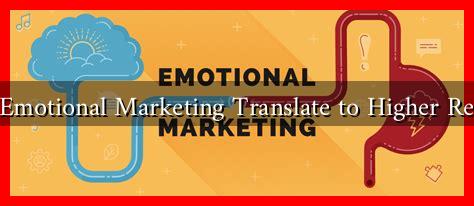-
Table of Contents
- Does Emotional Marketing Translate to Higher Revenue?
- The Power of Emotions in Marketing
- Case Studies: Success Stories in Emotional Marketing
- 1. Coca-Cola: The Power of Happiness
- 2. Nike: Inspiring Action
- 3. Dove: Real Beauty Campaign
- Statistics Supporting Emotional Marketing
- Challenges and Considerations
- Conclusion: The Bottom Line
Does Emotional Marketing Translate to Higher Revenue?
In today’s competitive marketplace, businesses are constantly seeking innovative ways to connect with consumers. One strategy that has gained significant traction is emotional marketing. This approach leverages the power of emotions to create a deeper connection with customers, ultimately driving sales and increasing revenue. But does emotional marketing truly translate to higher revenue? In this article, we will explore the effectiveness of emotional marketing, supported by case studies, statistics, and expert insights.
The Power of Emotions in Marketing
Emotions play a crucial role in consumer decision-making. According to a study by the American Marketing Association, emotional responses to advertisements can significantly influence purchasing behavior. Here are some key points to consider:
- Emotional Engagement: Consumers are more likely to remember and engage with brands that evoke strong emotions.
- Brand Loyalty: Emotional connections foster brand loyalty, leading to repeat purchases and long-term customer relationships.
- Word-of-Mouth Marketing: Emotionally charged campaigns often encourage consumers to share their experiences, amplifying brand reach.
Case Studies: Success Stories in Emotional Marketing
Several brands have successfully harnessed emotional marketing to boost their revenue. Here are a few notable examples:
1. Coca-Cola: The Power of Happiness
Coca-Cola’s “Open Happiness” campaign is a prime example of emotional marketing. By associating their product with feelings of joy and togetherness, Coca-Cola not only increased brand awareness but also saw a significant uptick in sales. According to reports, the campaign contributed to a 2% increase in global sales in the year it launched.
2. Nike: Inspiring Action
Nike’s “Just Do It” campaign taps into the emotions of determination and empowerment. By featuring athletes overcoming challenges, Nike resonates with consumers on a personal level. This emotional connection has translated into impressive financial results, with Nike reporting a revenue increase of 10% in the year following the campaign’s launch.
3. Dove: Real Beauty Campaign
Dove’s “Real Beauty” campaign challenged traditional beauty standards and promoted self-acceptance. This emotionally driven initiative not only sparked conversations but also led to a 700% increase in sales over a ten-year period. Dove’s success illustrates how emotional marketing can redefine brand identity and drive revenue growth.
Statistics Supporting Emotional Marketing
Numerous studies highlight the effectiveness of emotional marketing in driving revenue:
- A study by McKinsey & Company found that emotionally connected customers are more than twice as valuable as highly satisfied customers.
- According to a report by HubSpot, 55% of consumers are more likely to purchase from a brand that shares their values and beliefs.
- Research from Vidyard indicates that emotional storytelling can increase conversion rates by up to 30%.
Challenges and Considerations
While emotional marketing can be highly effective, it is not without its challenges. Brands must navigate the following considerations:
- Authenticity: Consumers can quickly detect inauthentic emotional appeals, which can damage brand reputation.
- Target Audience: Understanding the emotional triggers of your target audience is crucial for effective campaigns.
- Balancing Emotion and Logic: While emotions drive decisions, consumers also rely on logical reasoning. A balanced approach is essential.
Conclusion: The Bottom Line
Emotional marketing has proven to be a powerful tool for brands looking to enhance customer engagement and drive revenue. By creating authentic emotional connections, brands can foster loyalty, encourage word-of-mouth marketing, and ultimately increase sales. The success stories of Coca-Cola, Nike, and Dove illustrate that when executed effectively, emotional marketing can lead to significant financial gains.
As businesses continue to evolve in a rapidly changing marketplace, leveraging the power of emotions will remain a critical strategy for driving revenue and building lasting customer relationships. In a world where consumers are inundated with choices, emotional marketing offers a pathway to stand out and resonate with audiences on a deeper level.


